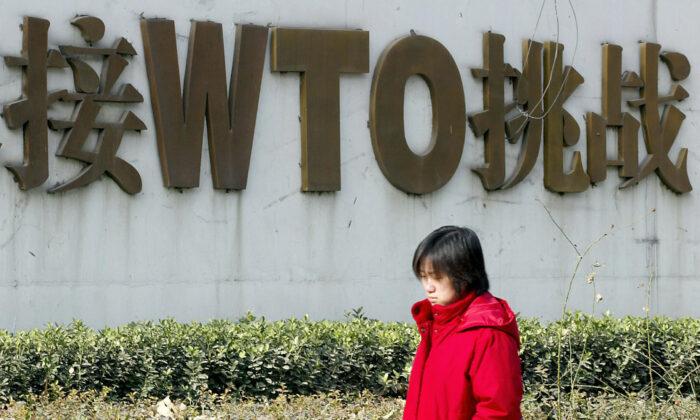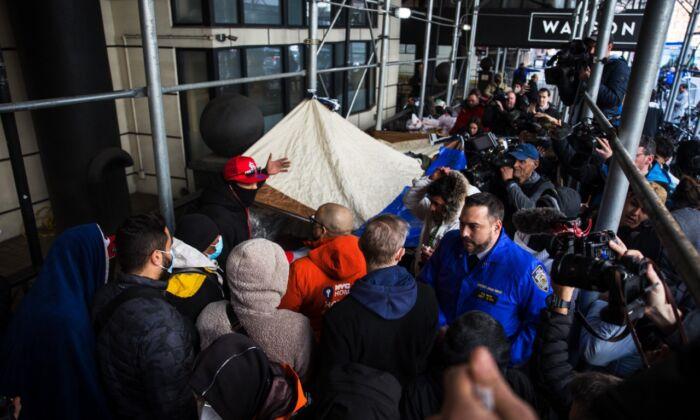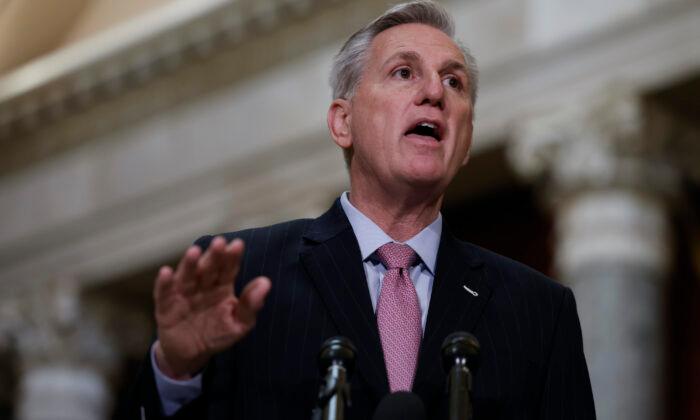China has not lived up to its commitments on fair trade in the past two decades, and has little will to do so, despite the world looking to its transition toward free-market capitalism, experts said.
“China has never really observed the rules of the World Trade Organization. It has taken advantage of the World Trade Organization [WTO],” Clyde Prestowitz, president and founder of the Economic Strategy Institute, told the Chinese edition of The Epoch Times. Prestowitz is also the author of “The World Turned Upside Down: America, China, and the Struggle for Global Leadership.”
“If you just look at what China has been doing in its trade with Australia, It’s actually, sadly, halting Australian imports,” he said. “Of course, China is making some excuses.”
Over the past 18 months, Beijing has limited imports of Australian beef, coal, and grapes as part of its economic coercion, besides tariffs on Australian wine and barley. The downward spiral on high-level diplomatic relations came straight after Canberra’s call for an international inquiry into the origins of the global pandemic.
“Australia is one of numerous WTO members that has experienced this first-hand,” said Australia’s ambassador George Mina as he addressed the eighth review of China’s trade policy at the WTO in Geneva on Oct. 20 and 22, saying China “has increasingly tested global trade rules and norms.”
WTO rules did not allow member states—no matter how large they are—to impose such conditions on other nations, Mina noted.
“Today, those challenges remain before us,” he said.
State Capitalism
Reports (pdf) find foreign businesses still don’t feel welcome in China, as restrictions on market participation are still in place. Yet Chinese companies can operate with far fewer restrictions in the United States and Europe.Foreign chambers of commerce in China have called on Beijing to end unfair protection and financial favoritism for its state-owned enterprises—which also sits at the heart of the Sino-U.S. trade war.
“China may be a market-oriented economy, but it is not, in my opinion, a full market economy,” said Graceffo. “The government has so much control over the economy and over firms.”
By some measures, state-owned firms still account for 40 percent of China’s economy, according to Graceffo, excluding state-controlled firms.

“State-owned, state-controlled, or state-favored firms get access to capital. They get the raw materials pouring in from the Belt and Road Initiative,” he said.
Differentiated treatments also include government protections over legal disputes, bank loans, soft loans, and subsidies.
Double Standards
The West has tacitly recognized China’s double standard, said Graceffo. “Most western countries have two sets of rules, one set for foreign companies, and one for China.”“Chinese firms are permitted to invest in almost any area of the U.S. economy, but there is a long list of sectors that U.S. firms are not permitted to invest in China,” he said.
“There is another list where a U.S. firm could invest, but only with a 51 percent joint venture partner, and agreeing to transfer technology to the Chinese firm may be a condition of operating in that sector.”
Graceffo said that is when concerns arise over forced technology transfer.
Meanwhile, Chinese firms listing on U.S. exchanges claim that they are not permitted under Chinese law to be audited by a third party, said Graceffo. “If a U.S. company made such an outrageous claim in China, they would be immediately shut down and the principals might be jailed.”
“Look at little things that we take for granted,” he said.
“China set up Confucius institutes around the world. Is the world allowed to set up Abraham Lincoln Institutes or Socrates Centers in China? Of course not, the laws on foreign ownership of schools in China have been increasingly tighter.”
In a late-July order ostensibly to lighten students’ workloads, Chinese authorities made it illegal for off-campus tutoring agencies to provide foreign teaching, or employ tutors based overseas.

“It has not treated outside countries and companies in the way that the World Trade Organization should be treated,” said Prestowitz.
No Will to Change
This December marks the 20th year since China joined the WTO, yet analysts find China has no inclination to change.At the WTO review in Geneva, Chinese Commerce Minister Wang Wentao denied the wrongdoings, asking the WTO to affirm its future participation—as a developing country. The status allows China to benefit from the unilateral trade preference, a scheme that does not require reciprocity from beneficiary countries.
Since China became the 143rd member of WTO on Dec. 11, 2001, it has remained the self-declared status as a “developing country.”
Although the WTO does not define “developed” or “developing,” leaving its individual members to decide, the differentiation grants a self-designated “developing” country weaker obligations to take on, by offering exemption from many provisions. It also approves longer time frames to comply with global rules on e-commerce, subsidies, state-led economies, etc.
“The thinking was that if they had to comply with all of the rules, they would not be able to make money or develop quickly, so the United States and the world community gave China a very liberal timeline on which to reach 100 percent compliance with the rules,” said Graceffo.
Yet China, the world’s now second-largest economy and the top trading nation, refuses to give up the claim as it did over the past two decades.
“When China joined the WTO it likely never intended to follow WTO rules,” economist and author Milton Ezrati told the Chinese edition of The Epoch Times.
“It was not a China-made miracle,” said Graceffo, but the then-U.S. politicians help China trade with the world.
He believes the United States should push for the second phase of trade negotiations with China that would require the latter to transform the way it trades and operates.

“These are fundamental, systemic problems in the Chinese economic and political system. China sees any attempt to change these policies as an infringement on [its] sovereignty,” said Graceffo.
“And China will never do that willingly,” he said.
Meanwhile, several of the practices are targeted in the first phase of the two-phase deal signed in January 2020, said Ezrati. He believed the United States has few choices but to impose punitive tariffs on Chinese exports, “and make clear that they will remain in place if and until Beijing changes its practices.”
“[Yet] I am skeptical that Biden can, as he says he wants to, unite allies, within the WTO or outside of it,” said Ezrati.
“For one, the Europeans seem determined to play both sides at once. For another, the WTO has thus far shown itself incapable of disciplining China on its rule-breaking.”




